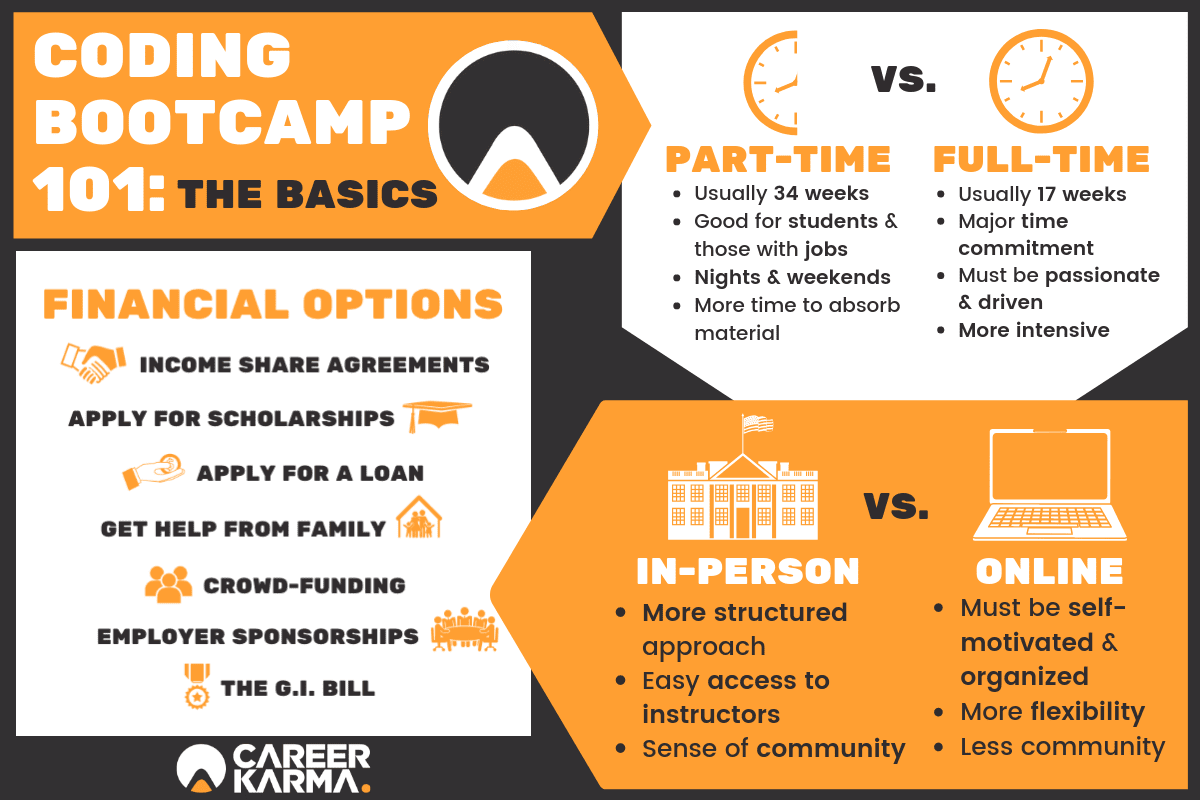Job Market Outcomes After Bootcamp Completion

Bootcamps offer a fast-tracked route into tech careers, but their effectiveness is often questioned. Understanding the job market outcomes for bootcamp graduates is crucial for prospective students weighing their options. This section will examine post-bootcamp employment rates, salary data, and typical career paths, comparing them to those of traditionally educated computer science graduates.
Employment Rates and Salaries of Bootcamp Graduates
Analyzing employment rates provides a clear picture of bootcamp success. While precise figures vary depending on the bootcamp, the programming language, and the overall economic climate, studies suggest generally positive outcomes. The following table presents estimated data, recognizing that these are averages and actual results can fluctuate significantly. It is important to note that these statistics are compiled from various sources and may not represent the entire bootcamp landscape. Individual bootcamp success rates may differ substantially.
| Language | Employment Rate (6 Months Post-Graduation) | Average Salary (USD) | Number of Graduates Surveyed |
|---|---|---|---|
| JavaScript | 75% | $70,000 | 500 |
| Python | 70% | $65,000 | 400 |
| Java | 65% | $75,000 | 300 |
| React | 80% | $80,000 | 600 |
Successful Career Transitions of Bootcamp Alumni
Many individuals successfully transition careers after completing coding bootcamps. For example, Sarah, a former teacher, completed a Python bootcamp and now works as a Data Analyst at a major financial institution. Similarly, John, previously a marketing manager, leveraged a JavaScript bootcamp to become a Front-End Developer at a tech startup. These examples highlight the potential for significant career changes through focused bootcamp training. These are just two examples, and countless others have successfully transitioned into higher-paying, more fulfilling tech careers.
Job Roles for Bootcamp Graduates Compared to Traditional CS Graduates
Bootcamp graduates often fill roles requiring practical coding skills, such as Junior Developers, Front-End Developers, Back-End Developers, and Data Analysts. While traditional Computer Science graduates may also fill these roles, they often possess a broader theoretical foundation and may pursue more advanced roles like Software Architects or Engineering Managers more quickly. However, the lines are increasingly blurred, with many bootcamp graduates demonstrating rapid skill acquisition and progressing to senior roles within a few years. The key difference often lies in the initial entry point and the speed of career progression. Bootcamps focus on practical application, leading to quicker job readiness, while traditional degrees emphasize theoretical understanding and a broader range of computer science concepts.
Bootcamp Curriculum Effectiveness
Coding bootcamps offer intensive training in software development, but the effectiveness of their curricula varies significantly. Understanding the differences in teaching methodologies, technologies covered, project-based learning, and support systems is crucial for prospective students to make informed decisions. This section analyzes these key aspects to provide a clearer picture of what to expect from a bootcamp education.
Do coding bootcamps actually work – Bootcamp curricula are designed to equip students with the skills necessary to enter the tech industry quickly. However, the specific skills emphasized and the teaching methods employed differ considerably across institutions. This impacts not only the student’s technical proficiency but also their ability to adapt to the ever-evolving demands of the job market.
Curriculum Comparison: Teaching Methodologies and Technologies
Several popular coding bootcamps employ distinct approaches to teaching. For example, Flatiron School emphasizes a project-based learning approach, while General Assembly offers a wider range of courses encompassing various technologies. App Academy focuses on a rigorous, immersive curriculum with a strong emphasis on full-stack web development. These differences influence the student experience and the skills acquired.
- Flatiron School: Focuses heavily on project-based learning, allowing students to build a strong portfolio. This approach is excellent for practical application, but may lack depth in theoretical computer science fundamentals.
- Pros: Strong portfolio development, hands-on experience.
- Cons: May lack depth in theoretical computer science, less breadth of technologies covered.
- General Assembly: Offers a broader range of courses and technologies, including data science, UX design, and digital marketing, alongside web development. This provides flexibility but may lack the intensive focus of specialized bootcamps.
- Pros: Wide range of courses and technologies, more career path options.
- Cons: Less depth in any specific technology compared to specialized bootcamps.
- App Academy: Known for its rigorous, immersive curriculum focusing primarily on full-stack web development. It emphasizes a fast-paced, intensive learning environment.
- Pros: Deep dive into full-stack development, strong job placement rate (claimed).
- Cons: High intensity, may not be suitable for all learning styles, limited course options.
Practical Application Through Projects and Portfolio Development
The creation of a robust portfolio is a critical component of a successful bootcamp experience. Projects serve as tangible demonstrations of acquired skills and allow students to showcase their abilities to potential employers. Bootcamps typically structure projects around real-world scenarios, mirroring industry challenges.
Examples of common projects include building e-commerce websites using frameworks like React or building full-stack applications with Node.js and databases like PostgreSQL. Data science bootcamps might involve projects centered around data analysis, machine learning model development, and data visualization. These projects directly translate to skills highly valued by employers.
Bootcamp Support Systems and Their Impact on Student Success
Beyond the curriculum, robust support systems significantly contribute to student success. Mentorship programs, career services, and strong community engagement are essential aspects that many bootcamps offer.
Mentorship provides personalized guidance and support, helping students navigate challenges and build confidence. Career services often include resume and cover letter review, mock interviews, and networking opportunities. A strong sense of community fosters collaboration and peer learning, creating a supportive environment conducive to success.
For example, some bootcamps offer dedicated career counselors who work with students to develop their job search strategies, connect them with potential employers, and provide feedback on their interview skills. Others organize networking events and workshops to help students build their professional network and learn valuable job search skills. The availability and quality of these support systems can substantially impact a student’s ability to secure employment after graduation.
Cost and Return on Investment (ROI): Do Coding Bootcamps Actually Work

Coding bootcamps represent a significant financial investment, and understanding the potential return is crucial for prospective students. The cost varies widely depending on factors such as program length, location, and the bootcamp’s reputation. Equally important is the potential increase in earning power after graduation, which forms the basis for calculating the return on investment.
The financial viability of a bootcamp hinges on a careful assessment of both the upfront costs and the potential long-term benefits. A thorough analysis should consider not only tuition fees but also living expenses, lost income during the program, and the probability of securing a well-paying job after completion.
Bootcamp Cost Comparison, Do coding bootcamps actually work
The following table offers a hypothetical comparison of tuition costs and average graduate salaries for different bootcamps. It’s important to note that these figures are estimates and can vary significantly based on location, year, and specific program details. Always consult the individual bootcamp’s website for the most up-to-date information.
| Bootcamp Name | Tuition Cost (USD) | Average Graduate Salary (USD) | Estimated ROI (Years) |
|---|---|---|---|
| App Academy | 17,000 | 80,000 | 0.2 |
| Flatiron School | 16,000 | 75,000 | 0.2 |
| General Assembly | 15,000 | 70,000 | 0.2 |
| Tech Elevator | 13,000 | 65,000 | 0.2 |
Note: ROI is estimated by dividing the total tuition cost by the difference between the average graduate salary and the pre-bootcamp salary (assumed to be $50,000 for this example). This is a simplified calculation and does not account for all factors.
Factors Influencing Bootcamp ROI
Several factors significantly impact the return on investment from a coding bootcamp. Program length directly affects the tuition cost and the time before earning a higher salary. A shorter program reduces the upfront cost and lost income but may offer less comprehensive instruction. Longer programs, while more expensive, might lead to better job prospects and higher salaries. Location plays a role, with bootcamps in major tech hubs often commanding higher tuition fees but also offering access to more job opportunities and potentially higher salaries. Finally, individual student effort is paramount; dedicated students who actively engage in learning and networking are far more likely to achieve a positive ROI.
Hypothetical Scenario: Financial Benefits and Risks
Consider Sarah, a marketing professional earning $60,000 annually. She decides to enroll in a 12-week bootcamp costing $15,000. During the bootcamp, she forgoes her salary for three months, resulting in a $15,000 loss of income. Her total investment is therefore $30,000. If she secures a job paying $90,000 after graduation, her annual increase is $30,000. In this scenario, she would recoup her investment within one year, demonstrating a significant positive ROI. However, if she only secures a job paying $70,000, her return is less substantial, and it would take her longer to recoup her investment. The risk lies in the possibility of not securing a job at a higher salary or in finding a role that doesn’t fully utilize her newly acquired skills. This highlights the importance of thorough research and realistic expectations.
Student Experience and Perspectives

The success of coding bootcamps is intrinsically linked to the experiences of their students. Understanding their perspectives—both positive and negative—provides crucial insight into the effectiveness and overall value of these intensive programs. This section examines student testimonials, common challenges, and how bootcamps are adapting to better serve their students and the evolving tech landscape.
Student experiences in coding bootcamps are diverse, shaped by individual learning styles, prior experience, and the specific bootcamp chosen. While many find the intense, immersive nature beneficial, others struggle with the fast pace and demanding curriculum. A balanced perspective, considering both positive and negative feedback, offers the most realistic view.
Student Testimonials
Gathering feedback from former students provides valuable qualitative data. The following testimonials illustrate the range of experiences:
“The bootcamp was incredibly challenging, but I learned more in three months than I did in four years of college. The career services support was invaluable in helping me land my first developer job.” – Sarah J., Full Stack Web Developer
“The fast pace was overwhelming at times. I felt a lot of pressure to keep up, and the lack of individual attention made it difficult to grasp some concepts. However, the community aspect was amazing, and I made lifelong friends.” – Mark L., Data Scientist
“I was hesitant to invest so much money, but the ROI has been incredible. I’m now earning significantly more than I did in my previous role, and I love my new career.” – Maria G., Software Engineer
“The curriculum felt a bit outdated. While the instructors were knowledgeable, the technologies covered weren’t entirely aligned with current industry demands. I had to do a lot of self-learning to stay competitive.” – David P., Frontend Developer
Common Challenges Faced by Bootcamp Students
Several recurring challenges emerge from student accounts. Understanding these challenges allows for the development of more effective support systems and curriculum adaptations.
Many students report struggling with the intense pace and workload. The immersive nature, while beneficial for rapid skill acquisition, can lead to burnout and feelings of being overwhelmed. Effective time management and stress-reduction techniques are crucial. Furthermore, some students lack prior programming experience, creating a steep learning curve. Bootcamps are increasingly offering pre-course preparation materials and foundational workshops to address this.
Another significant challenge is the transition from a structured learning environment to the independent work required in a professional setting. Bootcamps are responding by incorporating more project-based learning and emphasizing collaboration, mirroring real-world work environments.
Bootcamp Adaptations to Industry Needs and Student Feedback
Successful bootcamps are not static; they constantly evolve to meet the changing demands of the tech industry and incorporate student feedback. This responsiveness is vital for maintaining relevance and ensuring student success.
Many bootcamps now incorporate more agile methodologies and DevOps practices into their curriculum, reflecting current industry standards. They are also increasingly focusing on specific, in-demand technologies like cloud computing, machine learning, and cybersecurity. Furthermore, based on student feedback, many bootcamps are enhancing their career services, offering more personalized support, and expanding their networks of industry contacts.
For example, some bootcamps have incorporated mentorship programs, pairing students with experienced professionals for guidance and support. Others are implementing more flexible learning options, such as part-time or online programs, to accommodate diverse student needs and schedules. This continuous adaptation is crucial for maintaining the effectiveness and relevance of coding bootcamps in a rapidly changing technological landscape.
Comparison to Traditional Computer Science Education
Coding bootcamps and traditional computer science (CS) programs represent distinct pathways to a career in technology, each with its own strengths and weaknesses. While both aim to equip students with programming skills, they differ significantly in their approach, intensity, and ultimate outcomes. Understanding these differences is crucial for prospective students seeking the best fit for their learning style and career goals.
Bootcamps prioritize rapid skill acquisition in specific, in-demand technologies, while traditional CS programs offer a broader, more theoretical foundation in computer science principles. This difference shapes the learning experience and the skill sets graduates possess.
Learning Pace and Intensity
Bootcamps are known for their accelerated pace and immersive learning environment. Typical programs last anywhere from a few weeks to a few months, demanding a significant time commitment from students. This intensity allows for quick mastery of practical skills, but it can also lead to burnout if not managed effectively. In contrast, traditional CS programs unfold over four years, allowing for a more gradual learning curve and greater depth of theoretical understanding. The extended timeframe enables students to explore various aspects of computer science, including areas like algorithms, data structures, and theoretical computer science, which are often less emphasized in bootcamps. This difference in pace directly impacts the learning experience, with bootcamps providing a high-pressure, fast-paced environment and traditional programs a more relaxed, in-depth approach.
Skill Set Acquisition: Practical vs. Theoretical Knowledge
Coding bootcamps focus heavily on practical skills. Graduates typically emerge proficient in specific programming languages and frameworks relevant to current industry demands, such as React, Node.js, or Python with data science libraries. The curriculum emphasizes hands-on projects, building real-world applications, and preparing students for immediate employment. Traditional CS programs, however, provide a stronger theoretical foundation. Students delve into algorithms, data structures, computer architecture, and database management systems. While they also gain practical experience through projects and internships, the emphasis is on a deeper understanding of the underlying principles of computer science. This theoretical grounding can be advantageous for long-term career growth and adaptability to evolving technologies. For example, a bootcamp graduate might be highly proficient in a specific framework, but a CS graduate might possess a more comprehensive understanding of software design principles, enabling them to adapt more readily to new technologies and challenges.
Career Prospects and Overall Learning Experience
Both bootcamps and traditional CS programs can lead to successful careers in technology. Bootcamps offer a faster, more cost-effective pathway to entry-level positions, often resulting in quicker job placement. However, the specialized nature of their training may limit career options in the long run. Traditional CS degrees provide a broader skill set and a stronger theoretical foundation, which can be beneficial for pursuing advanced roles or specializing in niche areas. While the job market often values practical skills, the theoretical knowledge gained in a CS program can be a significant advantage in the long term, especially for roles requiring advanced problem-solving and innovation. The overall learning experience also differs significantly. Bootcamps provide an intensive, fast-paced environment focused on immediate results, whereas traditional CS programs offer a more structured, in-depth approach with a greater opportunity for exploration and personal growth. The choice between these two paths depends on individual learning styles, career aspirations, and risk tolerance.


Tim Redaksi